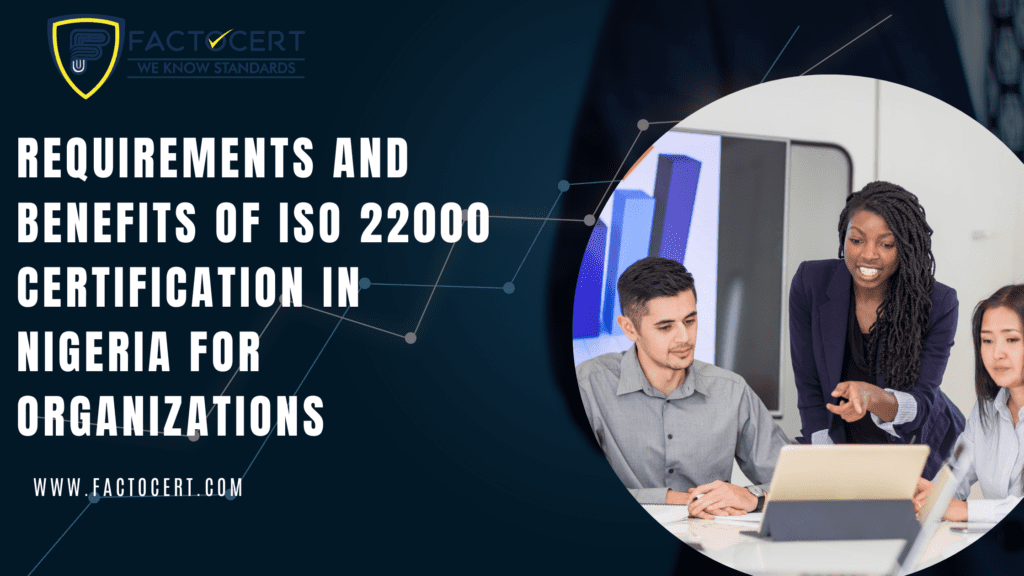ISO 22000 Certification In Nigeria
ISO 22000 Certification In Nigeria, The International Organization for Standardization publishes ISO 22000, a standard that assists organizations involved in the food supply chain in establishing and implementing a Food Safety Management System. In ISO 22000, the quality management factor of ISO 9001 certification is combined with HACCP processes to ensure food safety and quality! To prevent or mitigate risks, it helps organizations identify them and plan corrective actions.
To ensure food safety and quality for consumption, countries worldwide have enacted stringent regulations. To achieve ISO 22000 certification, an organization must deliver safe and healthy food.
Any organization of any scale- big or small, involved in any part of the food supply chain, such as production, distribution, or retail, can apply for ISO 22000 certification.
ISO 22000 Certification In Nigeria: What are the benefits?
In Nigeria, ISO 22000 certification can benefit companies by the following means:
- An improvement in communication within the organization and the management of processes.
- It guarantees the quality, safety, and reliability of food products.
- Recalls of unfit products reduce costs.
- Enhanced brand loyalty and a significant boost to your image in the market.
- Higher confidence in disclosures.
- Prevention of foodborne diseases.
- The morale of the employees is boosted.
- Utilization of resources effectively.
- The timely and efficient control of food safety hazards.
- A systematic approach to the management of prerequisite programs.
- Effective decision-making.
ISO 22000 Certification In Nigeria Requirements:
As part of the ISO 22000 standard, some requirements for implementing the Food Safety Management San organizations (FSMS) effectively exist. S4 to 10 of Annex SL list them. However, the first three sections of the standard mostly describe the standard’s scope, normative references, and terms and definitions. FSMS requirements are discussed in the remaining seven sections.
- Context of the organization – It covers all the factors that may affect your organization. External or internal may involve clients, customers, contractors, stakeholders, etc.
- FSMS Leadership- This section discusses the responsibilities of top management in ensuring an effective FSMS. It provides a method of transparently assigning roles to the staff and ensuring smooth communication.
- This section discusses identifying risks and preparing action plans in a timely manner.
- In Section 7, tools, technologies, and resources are described that are needed for FSMS implementation.
- The section on operation provides an assessment of existing procedures and compliance with legal requirements. The key requirement is to conduct risk assessments regularly.
- Your FSMS can be assessed regularly through monitoring and measurement. This ensures your management system’s ability to meet the objectives determined by your organization.
- Section 10: Improvement– This section ensures your organization can meet the changing market demands by continually improving the management system.
How to get ISO 22000 Certification In Nigeria?
You can obtain ISO 22000 certification through this section if you are a Nigeria-based business. Having developed your FSMS, you should operate it for some time and document the process before inviting a certification body for ISO 22000 certification. You must fill out an application form containing your organization’s details. To plan your certification audit, contact the certification body of your choice for a quotation.
The ISO 22000 certification process requires some mandatory steps. Having completed the documentation, you must follow the steps below to achieve accreditation:
- Document Check – This is the first step to verify your documentation and is conducted by an internal auditor.
- An organization’s management will review the gaps and identify the practical realities at this stage.
- Several disciplinary actions must be implemented to close the gaps identified by internal audit and management review. Proper documentation of all corrective measures should be in place to close the gaps.
ISO 22000 certification involves two stages:
- The reviewers of the certification body of your choice will check your documentation based on ISO 22000’s prerequisites in the first stage (documentation survey).
- Stage two (Primary audit) – ISO 22000 requirements are verified against your documentation. Reports, records, and company practices are investigated thoroughly.
Any organization can comply with the terms, but ISO does not certify them. A standard set of guidelines is all it provides. At SIS Certifications, we ensure your organization meets all ISO 22000 statutory norms. With more than 16000 clients worldwide across more than 55 countries and multiple certifications under our services, SIS Certifications stands out as one of the best certification bodies. Our vast pool of experienced auditors aims to comprehensively assess compliance with the set norms and certify based on adherence to the rigid standards. Contact us if you are looking for ISO 22000 to apply online in Nigeria.
For more information visit: ISO 22000 Certification In Nigeria





